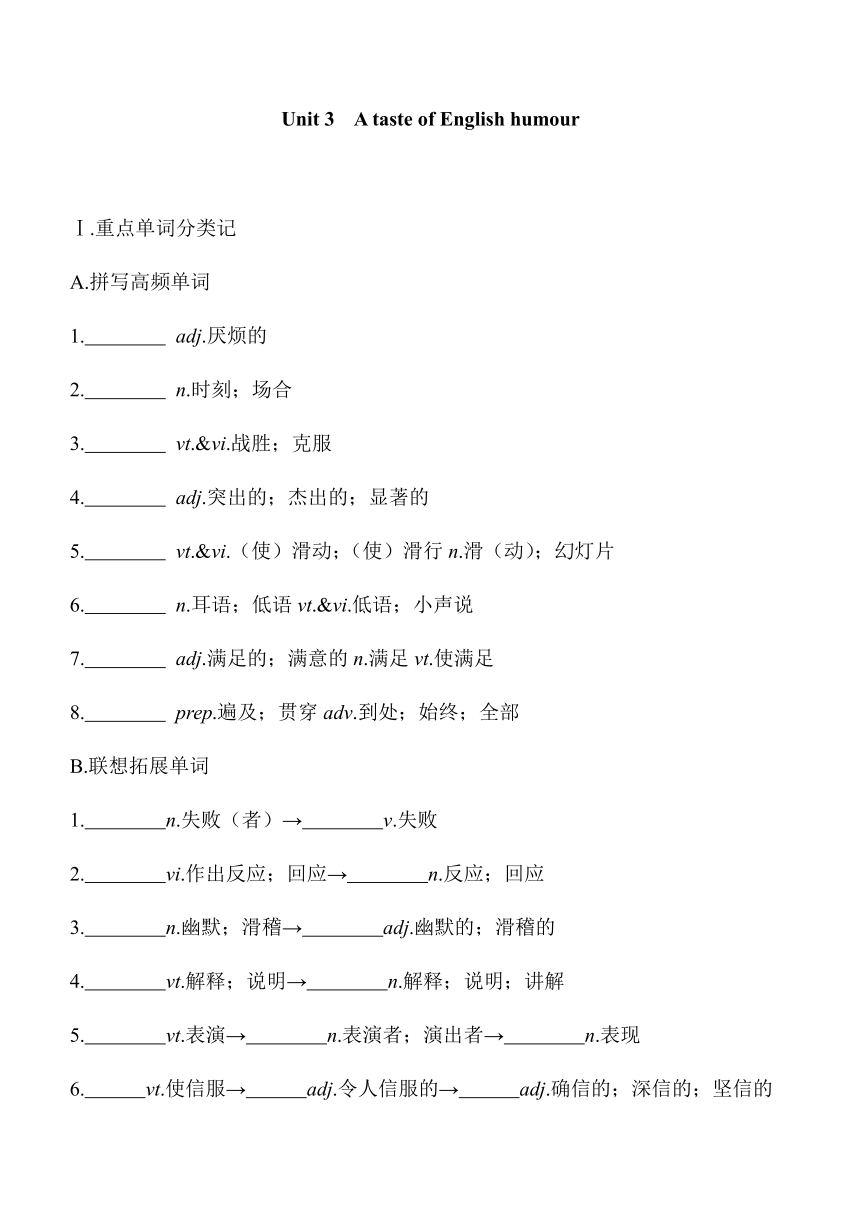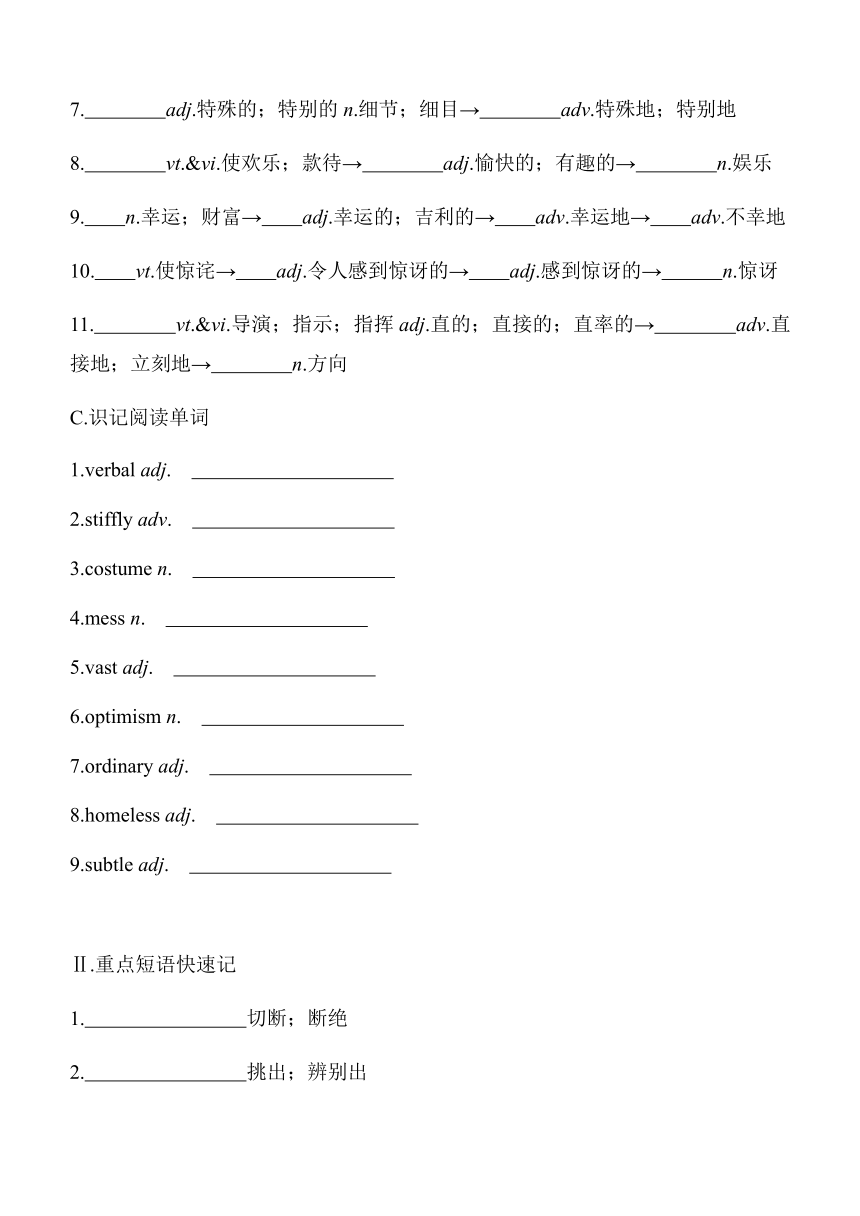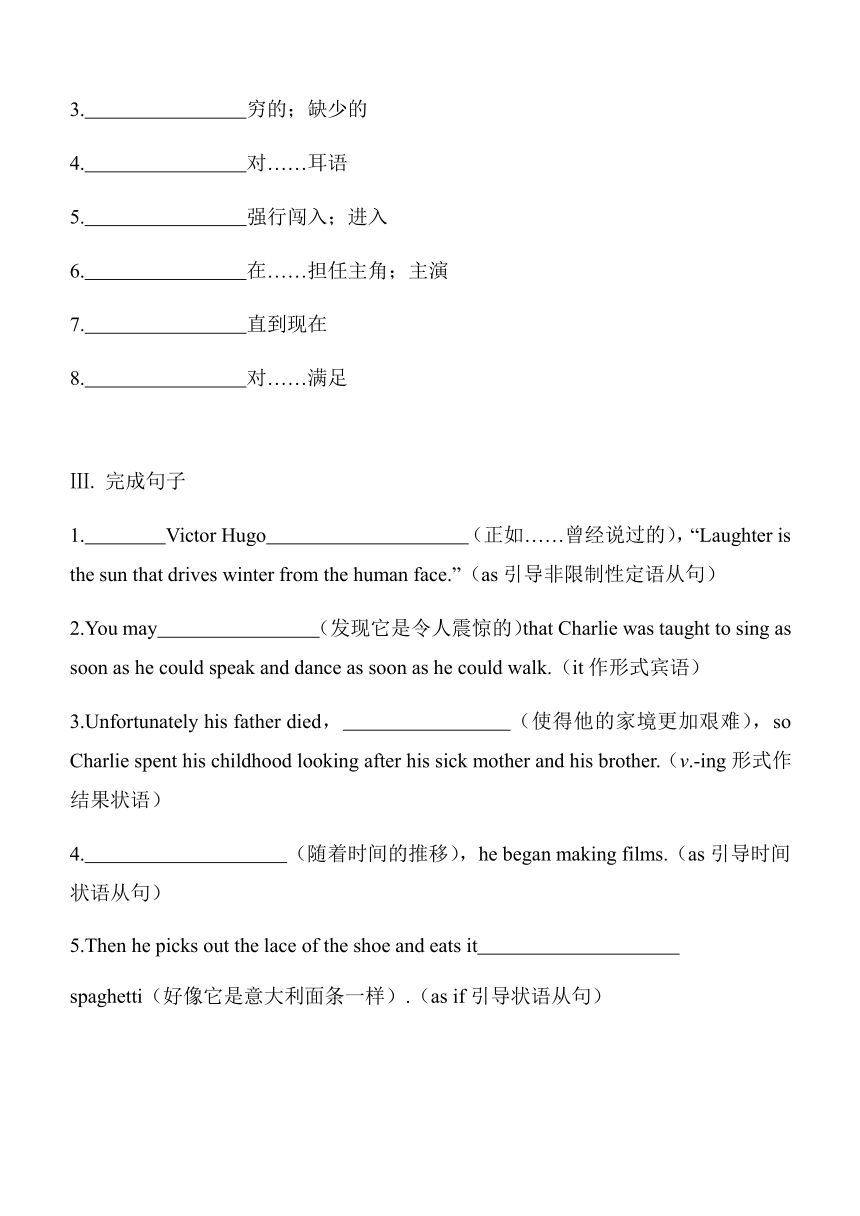人教新课标必修四 Unit 3 A taste of English humour 单元基础练习 含答案
文档属性
| 名称 | 人教新课标必修四 Unit 3 A taste of English humour 单元基础练习 含答案 |  | |
| 格式 | zip | ||
| 文件大小 | 28.5KB | ||
| 资源类型 | 教案 | ||
| 版本资源 | 人教版(新课程标准) | ||
| 科目 | 英语 | ||
| 更新时间 | 2020-02-11 16:34:07 | ||
图片预览



文档简介
Unit 3 A taste of English humour
Ⅰ.重点单词分类记
A.拼写高频单词
1. adj.厌烦的
2. n.时刻;场合
3. vt.&vi.战胜;克服
4. adj.突出的;杰出的;显著的
5. vt.&vi.(使)滑动;(使)滑行n.滑(动);幻灯片
6. n.耳语;低语vt.&vi.低语;小声说
7. adj.满足的;满意的n.满足vt.使满足
8. prep.遍及;贯穿adv.到处;始终;全部
B.联想拓展单词
1. n.失败(者)→ v.失败
2. vi.作出反应;回应→ n.反应;回应
3. n.幽默;滑稽→ adj.幽默的;滑稽的
4. vt.解释;说明→ n.解释;说明;讲解
5. vt.表演→ n.表演者;演出者→ n.表现
6. vt.使信服→ adj.令人信服的→ adj.确信的;深信的;坚信的
7. adj.特殊的;特别的n.细节;细目→ adv.特殊地;特别地
8. vt.&vi.使欢乐;款待→ adj.愉快的;有趣的→ n.娱乐
9. n.幸运;财富→ adj.幸运的;吉利的→ adv.幸运地→ adv.不幸地
10. vt.使惊诧→ adj.令人感到惊讶的→ adj.感到惊讶的→ n.惊讶
11. vt.&vi.导演;指示;指挥adj.直的;直接的;直率的→ adv.直接地;立刻地→ n.方向
C.识记阅读单词
1.verbal adj.
2.stiffly adv.
3.costume n.
4.mess n.
5.vast adj.
6.optimism n.
7.ordinary adj.
8.homeless adj.
9.subtle adj.
Ⅱ.重点短语快速记
1. 切断;断绝
2. 挑出;辨别出
3. 穷的;缺少的
4. 对……耳语
5. 强行闯入;进入
6. 在……担任主角;主演
7. 直到现在
8. 对……满足
Ⅲ. 完成句子
1. Victor Hugo (正如……曾经说过的),“Laughter is the sun that drives winter from the human face.”(as引导非限制性定语从句)
2.You may (发现它是令人震惊的)that Charlie was taught to sing as soon as he could speak and dance as soon as he could walk.(it作形式宾语)
3.Unfortunately his father died, (使得他的家境更加艰难),so Charlie spent his childhood looking after his sick mother and his brother.(v.?ing形式作结果状语)
4. (随着时间的推移),he began making films.(as引导时间状语从句)
5.Then he picks out the lace of the shoe and eats it
spaghetti(好像它是意大利面条一样).(as if引导状语从句)
IV 阅读理解
It is beyond embarrassing when everyone around you bursts out laughing at a joke that you do not find funny,especially if it's a joke told in a foreign language.
While Chinese students find it easy to adapt to a foreign lifestyle, socializing with locals is much harder, according to a recent study.Researchers looked at how well Chinese students integrated(融入) into communities across the world.Of all the activities they struggle with,understanding jokes is considered the toughest.
Most of the time,jokes are funny only for people who share a common cultural background or perceive humour in the same way.
Chinese?American comedian Joe Wong found this out first?hand. He had achieved huge success doing stand?up comedy in the US, but when he returned to China in 2008 for his first live show in Beijing,he discovered that humour doesn't translate.People didn't think his Chinese jokes were as funny as his English ones, the Global Times reported.
British humour vs American humour
British actor and comedian Simon Pegg discussed the differences between British and American sense of humour in a column for The Guardian.He believes that while Brits use irony(反讽) on a daily basis, the Americans do not see the point of using it so frequently.He wrote:“British jokes,on the other hand,tend to be more subtle with a dark or sarcastic (讽刺的) undertone...the American jokes are more obvious and forward,a bit like Americans themselves.”
Pegg showed his point by transcribing a joke he heard a British friend make, in the wake of family tragedy.
A:I had to go to my granddad's funeral last week.
B:Sorry to hear that.
A:Don't be.It was the first time he ever paid for the drinks.
“American humour is more straightforward like the punchlines(点睛之笔)in the famous TV show Friends,”an Internet user named Zac wrote on Zhihu.“You burst out laughing immediately when you watch American humour, and then you forget about it quite quickly,but it takes time to digest English humour, and it may be funnier when you reminisce(追忆往事)about it.”
判断正(T)误(F)。
1.When he returned to China in 2008,Joe Wong discovered that humour doesn't translate.( )
2.According to Pegg,Americans use irony as frequently as British people.( )
答案:
I.
A.1.bored 2.occasion 3.overcome
4.outstanding 5.slide 6.whisper
7.content 8.throughout
B 1.failure fail 2.react reaction 3.humour humourous 4.explain explanation 5.perform performer performance 6.convince convincing convinced 7.particular particularly 8.entertain entertaining entertainment 9.fortune fortunate fortunately unfortunately 10.astonish astonishing astonished astonishment 11.direct directly direction
C 1.口头的 2.僵硬地 3.服装;戏装 4.脏或乱的状态
5.巨大的;辽阔的 6.乐观;乐观主义 7.平常的;普通的 8.无家的;无家可归的 9.微妙的;精巧的;技艺精湛的
II
1.cut off 2.pick out 3.badly off 4.whisper to...
5.break into 6.star in 7.up to now 8.feel/be content with
III
1.As once said
2.find it astonishing
3.leaving the family even worse off
4 As time went by
5.as if it were
IV
1.T
2.F
同课章节目录
